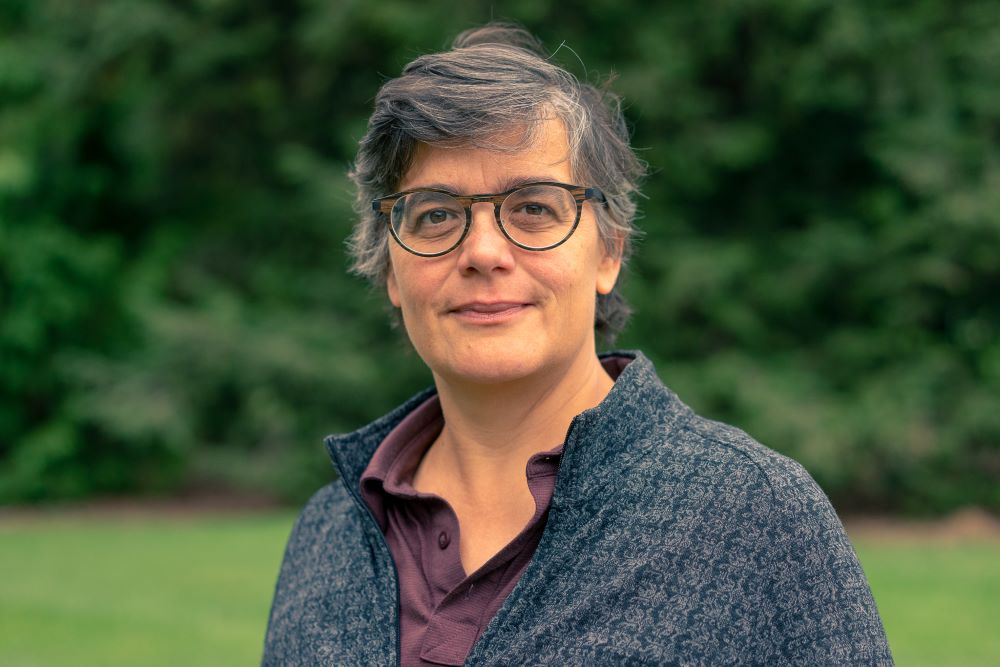Ellen McCallum, professor in the Department of English and Faculty Fellow at the Center for Gender in Global Context, or GenCen, shares how the Lesbian, Gay, Bisexual, Transgender, Queer and Sexuality Studies program at MSU offers an opportunity to gain a broader historical and social context for understanding personal and collective identities. As associate chair of undergraduate studies in the Department of English in 2010, McCallum introduced a course on literature and sexuality that became part of the LGBTQ minor program. McCallum also has led the MSU education abroad program on Sexual Orientation, Gender Identity, and Sexual Politics in Amsterdam that intersects disciplines in the College of Arts and Letters, GenCen and James Madison College.
A highlight of my career at MSU has been collaborating with the GenCen in course development for the LGBTQ minor and especially working with students enrolled in those classes. And yet, it seems that many students at MSU, even those who identify as LGBTQ, are unaware of this program. I want to help amplify the program and courses that exist.
You don’t have to identify as LGBTQ to take classes in queer studies. These classes offer an opportunity to learn more about yourself and others through the perspectives of queer studies. This includes the larger historical contexts in which each individual experiences their lives and the various ways that sexuality and gender have been interpreted and practiced in different cultures and times.
In the U.S., identities are often understood in very individualistic terms. However, much of the work of queer theorists, feminist theorists and critical race theorists shows how identities are systemically organized and systemically deployed to give some people power over many others. Taking courses in LGBTQ studies can offer students, especially those who are queer-identified, the conceptual and practical tools to work against oppression and to analyze and critique the norms we often unthinkingly inhabit. These approaches give us critical frameworks for imagining how we might live differently.
Over my career, my research has focused on queer and feminist theory, along with other theories of representation: film and media theory, literary theory, and critical theory. Theory can be heavy going, and the skills you need to grasp this work require a fluency between basic and more advanced reading strategies. What keeps me excited about teaching is the students and the discoveries they make through their learning. My goal in every class is to help students improve and refine their reading and writing. I firmly believe that anyone can find a pathway to and within these challenging texts to grow their knowledge. I also want to inspire students to keep reading and use reading as a way to connect with oneself, broader social events and each other!
Students at MSU come from so many different places, and not just geographically because we do draw from across Michigan. Some students might come from rural places that don’t even have a stoplight and others come from metropolitan areas like Detroit, or its suburbs. Regardless of where they come from, I find our students are keen to learn and have an inspiring intellectual curiosity about the world. But that is also a challenge about teaching here: “How do we foster students’ creativity and curiosity? How do we support their growth?” In my classrooms, I focus on student-centered, collaborative learning.
There are a lot of different courses that students can take based on their interests that can also encourage a sense of belonging for those who embrace these courses’ multidisciplinary approaches. LGBTQ classes specifically can help us learn about the different ways of relating that LGBTQ people have cultivated and the alternative frameworks for understanding our world that queer affords. LGBTQ studies also can help us to understand ourselves, our cultures, and find new ways to become more socially engaged.
This Faculty Voice was adapted from a piece that ran on the College of Arts and Letters website.
In October, MSU recognizes LGBT History Month, a monthlong observance of lesbian, gay, bisexual and transgender history, and the history of related civil rights movements. Visit The Gender and Sexuality Campus Center to learn about programs, resources and community.
